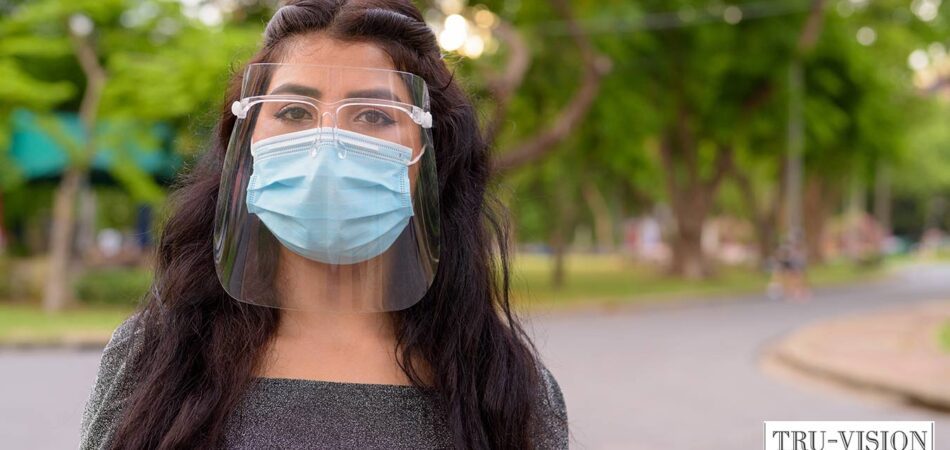
Tru-Vision Plastics customized face shields are an important part of protective equipment, which is used in a variety of medical settings.
This blog will discuss why face shields are used in hospitals and the benefits they have in healthcare.
We’ll also discuss the effectiveness of using a face shield for infection control.
With this information, you’ll be able to better understand why face shields are so important in healthcare and how they can help protect healthcare workers and patients.
Let’s get started!
Why are Face Shield Visors Used in Hospitals?
A face shield visor’s medical purpose is to shield the wearer’s face from flying debris, harmful or infectious chemicals, splashes, and droplets.
They are often used by staff in healthcare settings in conjunction with other protective gear, such as gowns, gloves, and masks, to avoid infection from patients.
Face shields are good at stopping bodily fluid spills and keeping them from getting inside workers’ mouths, noses, or eyes, where illnesses could develop.
Face shield visors are commonly used in healthcare settings, such as hospitals, to protect healthcare workers from exposure to infectious diseases.
The general public can also wear face shields to help prevent the spread of infection.
How Effective are Face Shields in Protecting Healthcare Workers?
Face shields and visors have become increasingly common in recent years as a means of protecting healthcare workers from exposure to the COVID-19 virus and other infectious diseases.
Face shields provide an additional layer of protection beyond masks, as they cover the entire face, including the eyes, nose, and mouth.
Face shields also help to keep healthcare workers from touching their faces, which can help to reduce the spread of germs.
How Should Face Shields Be Used?
Studies have found that face shields can significantly reduce the risk of healthcare workers being infected with infectious diseases.
However, face shields must be used properly to provide adequate protection.
Face shields should be worn with a well-fitted mask and cover the entire face, extending below the chin for optimal protection.
Additionally, face shields should be cleaned and disinfected to ensure effectiveness.
Overall, face shields are a valuable tool in the fight against infectious diseases, but they are not a replacement for other forms of PPE.
Healthcare workers should continue to use masks, gloves, and other PPE when interacting with patients or working in healthcare settings.
Healthcare workers should also be trained in proper hand hygiene and taught to don and doff PPE properly.
Infection Control Practices
Additionally, healthcare workers should be regularly checked for any signs of illness and provided with appropriate support and resources to help them stay healthy.
Healthcare workers should also be encouraged to get vaccinated against any infectious diseases, such as the flu, to help protect themselves and their patients.
Finally, healthcare workers should be provided with appropriate education and training on the proper use of PPE, face shields, hand hygiene techniques, and other infection control practices to help prevent the spread of any communicable diseases.
What are the Benefits of Using Face Shields in Healthcare?
Improved Safety:
Face shields protect healthcare workers, patients, and visitors in medical settings. They provide an additional barrier to help reduce the risk of exposure to airborne particles, droplets, and other contaminants.
Versatile Protection:
Face shields can be worn in various settings and easily adjusted to provide a comfortable fit for any user. This makes them suitable for various medical tasks, including administering IVs, drawing blood, and intubating patients.
Added Visibility:
Face shields improve visibility for healthcare workers, allowing them to see what they are doing while providing an added layer of protection.
Cost-Effective:
Face shields are an economical solution for medical settings, as they are much less expensive than other personal protective equipment.
Comfort:
Face shields provide comfort for healthcare workers, as they are lightweight, comfortable to wear, and do not interfere with their tasks.
What is the OSHA Standard for Face Shields?
The OSHA standard for face shields is that employers must protect workers from liquid chemicals, molten metal, flying objects, acids or chemical gases, caustic liquids or vapors, and injurious light radiation by providing personal protective equipment (PPE).
Face shields must provide complete facial protection and meet the American National Standards Institute (ANSI) Z87.1-1989 eye and face protection standards.
Why Do Surgeons Wear Face Shields?
Surgeons wear face shields for a variety of reasons.
First and foremost, face shields protect surgeons from exposure to blood and other bodily fluids. In the event of a splash or spray, the face shield will provide a barrier between the surgeon’s face and the contaminants.
In addition to protecting the surgeon from contaminants, face shields protect the surgical site from contamination.
This is especially important in delicate surgeries where even a small amount of contamination could lead to infection.
Face shields are an important part of the surgeon’s armor and help to ensure a safe and successful surgery.
Conclusion
In conclusion, face shields are vital safety equipment used in healthcare settings.
They provide an extra layer of protection against airborne contaminants and a physical barrier between healthcare workers and patients.
Face shields also help to reduce the risk of cross-contamination and protect the eyes and face from splashes and sprays of bodily fluids.
For these reasons, face shields are an important part of maintaining a safe and healthy environment in healthcare settings.
Tru-Vison Plastics works as a cohesive team to produce the highest quality American-made plastic products on time, every time.
They can offer distributors and manufacturers alike specialized and customized face shield visors.
Contact Tru-Vision Plastics today to speak to someone on our sales team.
